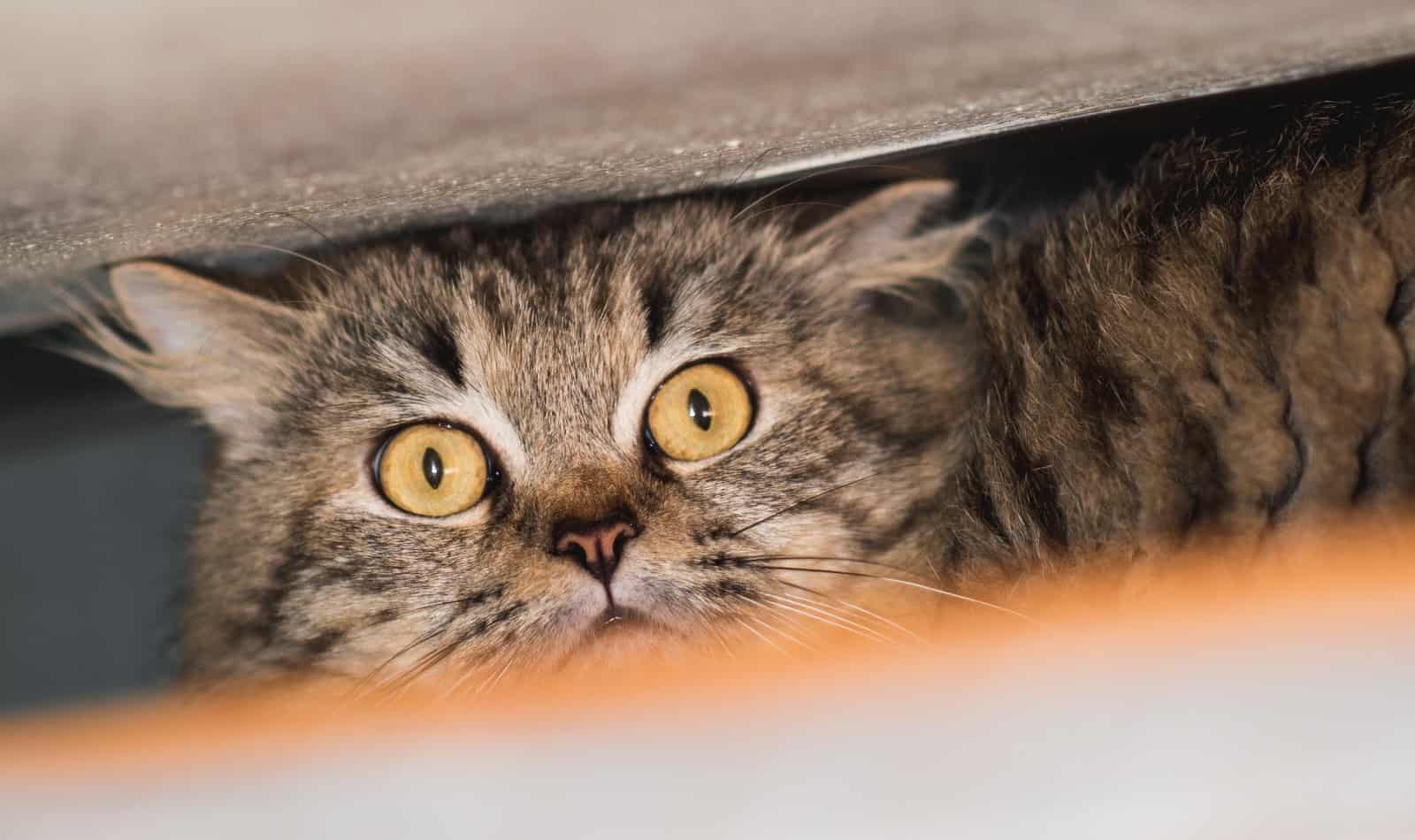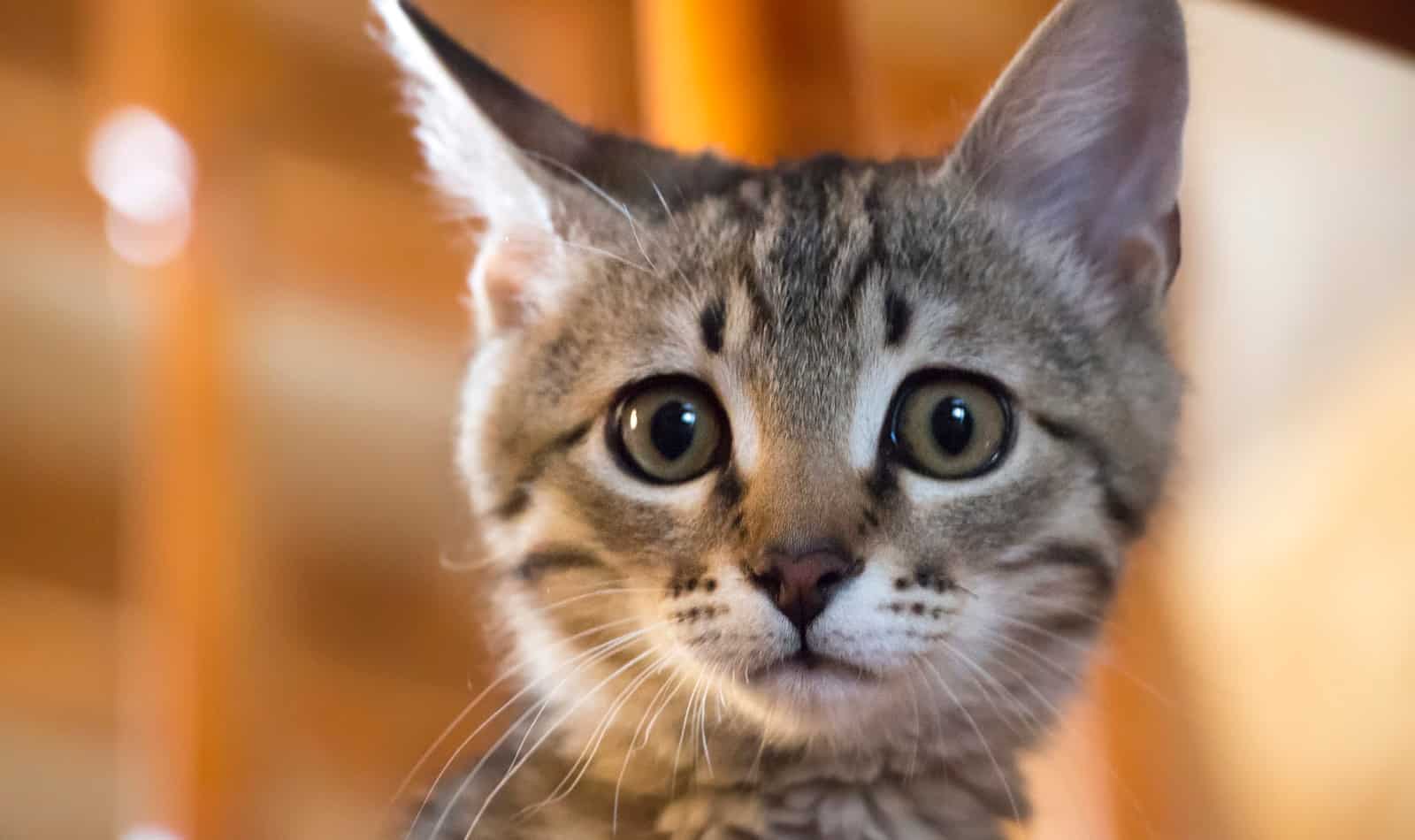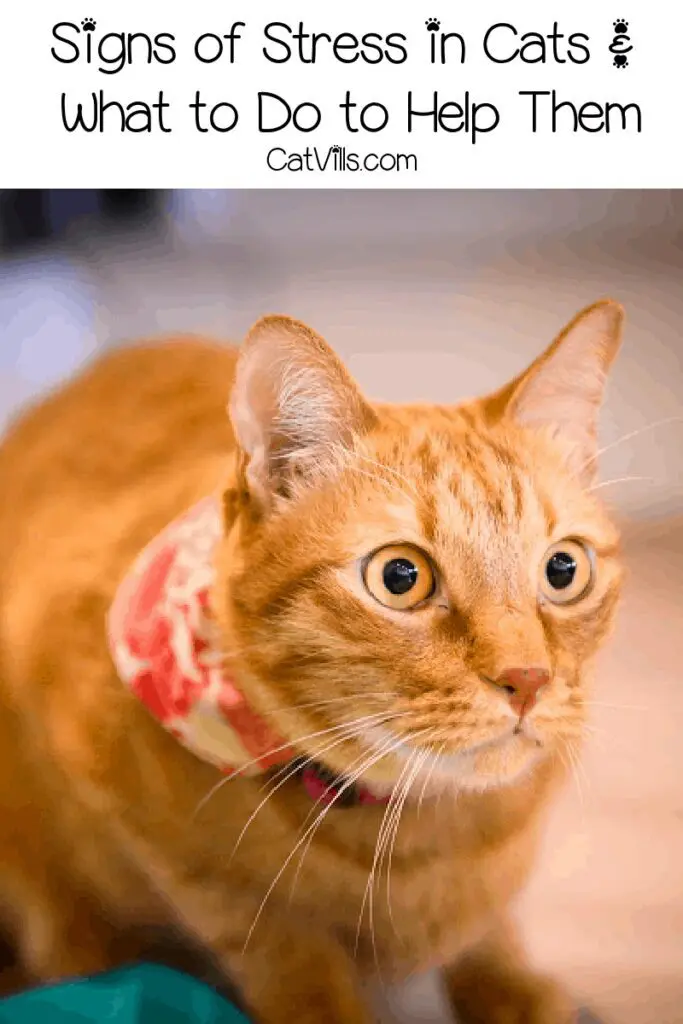Last Updated: 1 year ago
Cat stress signs are something that every cat owner should know about.
Unlike dogs, cats are very good at hiding stress, so being aware of their signals is a huge help in spotting if your cat is distressed.
In addition, an anxious cat is obviously an unhappy cat, so when you can spot signs, it makes it easier and faster for you to remedy the problem.
Because cats are so good at hiding their feelings, we’re going to be discussing the signs of stress in cats, its causes, and how to treat it.
Why Cats Hide Stress or Pain

While people often refer to the classic big cats as the ancestry of today’s domesticated cats, they’re really more like distant cousins.
In reality, today’s domesticated cats descend from Felis silvestris lybica, or the African Wildcat.
This is an independent, solitary breed without the benefit of a pride to help keep it safe, so showing any signs of distress or pain is like a flashing beacon that they’re easy targets.
Domesticated cats still keep this instinct to mask distress and/or pain intact, so it’s important to be able to spot the signs of cat stress so you can help your furry little pal.
10 Causes of Cat Stress
A cat can be stressed by a wide variety of situations, and these causes largely depend on your cat’s temperament.
For example, a high-strung cat that always seems to be on high alert can be stressed out by almost anything that is outside of their routine.
On the other hand, it might take a huge change in the environment or a really loud noise to stress or startle a laid-back kitty.
While there are myriad ways that any one cat might become stressed, the following causes tend to be the most common among cats:
1. Lack of Resources
Whether an actual lack of resources or a perceived lack of resources, this is a common cat stressor.
It’s most commonly seen in multi-cat homes when a cat might feel like they have to compete for food, water, litter box space, and the like.
Quality time with their owners can even be considered a resource.
2. Moving
Moving tends to be a stressor for cats. It doesn’t matter if you’ve adopted her from the shelter, she’s been rehomed, or you’ve made a move to a new house or apartment.
The disruption in your cat’s environment can be very stressful.
3. Introduction of New Pets
Whether your cat is a new pet or you’ve brought in a new pet, introducing new animals to a cat’s environment can be highly stressful for some cats.
This is because their territory is essentially being invaded by an outsider that cannot be driven off.
4. Too Much or Inappropriate Handling
Even the friendliest cat has her limits when it comes to petting. Always let your cat lead the way when it comes to interaction.
Pet her when she wants it, and let her mosey along when she’s done. Forced interaction or handling that is too rough, generally by children, can be extremely stressful to cats.
5. Home Decorating or Remodeling
Redecorating the home or remodeling any part of the home generally comes along with increased activity, unfamiliar noises, and general disruption in your cat’s environment.
As I mentioned in the moving bullet, some cats become very stressed if their environment is disrupted.
6. Change in Routine
This is actually a version of a change in a cat’s environment. You are part of your cat’s environment, and if your routine changes, it changes her environment.
This change can be anything from being away from home longer than usual to being home more than usual. Unlike dogs, cats value their alone time.
7. Guests
An extremely relaxed and confident cat may view visitors as new friends and sources of cuddling.
However, a nervous cat—the kind that tends to zip under the bed for almost any reason—can view guests as a source of stress.
8. A New Baby
To a cat, a new baby is essentially a new guest, and as we just covered, this can cause stress for some cats.
While bold cats will view the new baby as an oddity to be inspected, timid cats might be stressed out by the new sounds and smells associated with your bundle of joy.
9. Vet and Groomer Visits or Kenneling
Cats don’t do well when their environment is disrupted, and nothing is more disruptive than leaving the home.
This is especially true when leaving includes a trip to the vet or groomer, both of which involve activities that virtually all cats hate.
In addition, being kenneled can be an incredibly stressful experience for a lot of cats.
10. Boredom
Believe it or not, too little action can be a source of stress for a cat as well.
When cats don’t have an outlet for their energy and predatory instincts, it can be quite stressful for them.
They become balls of energy that cannot be released.
32 Signs of Cat Stress

While cats try to hide their stress or pain, they aren’t always successful. You’ll notice both physical and behavioral symptoms associated with a stressed cat.
Unfortunately, many of the signs of cat stress can also be signs that your cat is sick, so it’s important to take your cat to the vet immediately.
A visit to the vet will help you determine if your cat is stressed or sick, and in either case, your vet can help you address the issue.
Physical Signs
- Diarrhea
- Vomiting
- Overgrooming
- Bald patches or sores on the skin secondary to overgrooming
- Runny nose and eyes
- Pica: eating non-food items
- Decrease or loss of appetite
- Lethargy
- Excessive eating and drinking
- Sudden weight loss or gain
- Poor coat condition
- Reduced elimination
Behavioral Signs
- Hiding
- Excessive clinginess
- Inappropriate elimination
- Urine marking
- Excessive scratching
- Aggression toward you or other humans
- Aggression toward other pets
- Excessive vocalization
- Unresponsiveness to their environment
- Hyper-vigilance to the environment
- Reluctance to play if previously a very playful cat
- Pacing combined with excessive vocalization
- Often crouching and tense
- Ears flattened to the head
- Wide-open eyes with gigantic dilated pupils
- Staring at the floor
- Frequent head shaking
- Rippling and twitching of the skin on their back
- Exaggerated swallowing
- Quick flicks of the tongue onto the nose
Is it Stress or Sickness?
This is where I always advise taking your cat to the vet. As you can see from the list above, many symptoms of cat stress are also symptoms of various illnesses.
For example, excessive eating and drinking can be symptoms of diabetes, while vomiting and diarrhea could be symptoms of any number of GI issues.
With so many of the symptoms of cat stress also being potential symptoms of much more serious health issues, a trip to the vet is absolutely vital.
The only way to really know if your cat is stressed or has some sort of sickness or disease is to take her to the vet immediately for an examination.
Through this exam, your vet will be able to determine if your cat is stressed or under attack from some other illness. In either case, your vet will be able to recommend the most effective course of treatment.
Can cats die from stress?
Short answer? Yes. Although it’s not a straight line, stress can lead to death in your cat in a roundabout way.
While stress will not directly cause death, stress can lead to symptoms that, if not addressed, can cause such disturbance in your cat’s body that it can be deadly.
For example, when vomiting and diarrhea are left untreated, it can lead to severe dehydration and subsequent death if the GI issues are severe enough and prolonged enough.
Although rare, this is a very real, very serious possibility, which is why it gets its own section.
It’s also a prime example of a point that I tend to drive home with a sledgehammer in every post I write, which is to visit your vet sooner rather than later to get help.
Treatment of Stress in Cat
Treating cat stress involves a combination of environmental and behavioral approaches.
When you combine these, you can effectively reduce your cat’s stress levels, leaving them feeling happier and more at ease. These are all easy fixes that can drastically improve your cat’s mental health.
Adequate Resources
If you have a multi-cat home, be sure that your cats have access to the resources that they need.
Have at least one litter box on every floor of your home where your cats live. If you live in a single-story home, have a litter box for each cat in the home plus one extra.
In addition, separate each cat when feeding and have more than one water bowl.
You should also have several cat scratchers throughout the home so your cats never feel that they have to compete.
Adequate Playtime
Remember, you are a resource to your cat, so whether your cat is an “only child” or you have multiple cats, be sure that your kitty or kitties get adequate one-on-one time with you.
Cats need interaction just like dogs and people do.
Reduce Environmental Disruptions
If you have a jumpy cat and you’re having guests over or remodeling, create a safe zone for your cat.
If possible, outfit a room as far away as possible from the disruption in the home with a cat bed, scratcher, toys, and everything else your cat needs to be a happy camper.
Talk with Your Vet
If your pet determines that your cat is stressed, they can provide medical advice on how to help relieve the stress.
One of the things they can do that is quite helpful is refer you to a behavior specialist.
These specialists are certified in behavior therapy for a range of issues, including cat stress, and can be incredibly beneficial to the process of helping your cat destress.
How to Calm a Stressed Cat
Need to calm down your stressed cat asap? Try one of these two tactics below.
Again, you’ll still need to make a vet appointment, but they can soothe your kitty in the meantime.
Play Music
Studies have shown that cat music relaxes cats, so it can be a valuable tool in helping to calm a stressed cat.
This “cat music” is basically a soundtrack comprised of calming cat vocalizations like purring and suckling using the sound frequencies that cats use.
Use Feliway
Feliway is a line of calming pheromone products designed to reduce cat stress.
Available in diffusers and sprays, Feliway releases pheromones into the air that help calm a stressed cat.
Diffusers are simply plugged into an outlet in a room to provide a constant release of pheromone into the air, while the spray can be used in a more targeted way on bedding or in areas of a room.
Understanding Cat Stress to Effectively Treat It
If you understand the causes of cat stress, it’s easier to recognize them and treat them.
It’s of utmost importance to remember that many cat stress symptoms can also be symptoms of other illnesses, some quite severe, so it’s important to take your cat to the vet immediately if she shows any of the above symptoms.
Even if the vet determines that your cat is simply stressed out, they’ll be able to help you more effectively address the causes and resolve the issues. Good luck!
Have you seen any of these signs of cat stress? What worked for your kitty? Share below!
Resources:

